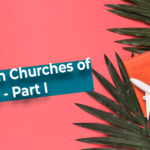Revelation 2 “To the angel of the church in Ephesus write:
These are the words of him who holds the seven stars in his right hand and walks among the seven golden lampstands. 2 I know your deeds, your hard work and your perseverance. I know that you cannot tolerate wicked people, that you have tested those who claim to be apostles but are not, and have found them false. 3 You have persevered and have endured hardships for my name, and have not grown weary.
4 Yet I hold this against you: You have forsaken the love you had at first. 5 Consider how far you have fallen! Repent and do the things you did at first. If you do not repent, I will come to you and remove your lampstand from its place. 6 But you have this in your favor: You hate the practices of the Nicolaitans, which I also hate.
7 Whoever has ears, let them hear what the Spirit says to the churches. To the one who is victorious, I will give the right to eat from the tree of life, which is in the paradise of God.”
Ephesus was the biggest city in Anatolia (Asia Minor) and the fourth biggest city in the whole Roman Empire with a population of 250.000 habitants. It was an enormous port city which was founded by the Ionian Greeks in the 11th century BC and was moved to its current location in the 3rd century BC. During the Roman Era, it was the residence of the Roman proconsul of Asia, which made it the capital of the Province of Asia. A temple for the imperial cult was built in the city in 89/90 AD during the reign of Domitian. In Antiquity, it was a huge cult center thanks to the Temple of Artemis (or Diana). It holds a distinguished place for Christianity as it is mentioned 17 times in the New Testament. It is also the city where the Third Ecumenical Council was held in 431, in which the holy motherhood of the Virgin Mary was accepted.
It is believed that in the first sentence of the letter there is an attribution to the omnipotence and omnipresence of God, although it is known that Domitian also minted some coins with his infant son who had recently deceased son seated on a globe with seven stars around it. The Ephesians are praised for their hard work and presence, but they are also warned against false prophets and teachings. The church in Ephesus was under the threat of false prophets in its early years. In the Acts 20:29-30, Paul prophesied that some of the Ephesian elders would turn their backs on the teachings of Christ when he was in Miletus. It is suggested that the church in Ephesus even doubted the message of John when he arrived in Ephesus.
Yet, years of pursuit for the correct doctrine made the Ephesians grow away from the correct practice and the only salvation would be repentance and love for each other. The “lampstand” probably symbolizes the leading role of the church of Ephesus and Jesus orders them to stay devoted to their faith or he would take away their role and give to any other congregation. Ephesus was a very important ecclesiastical center until Constantinople gained precedence in the 4th century. The Third Ecumenical Council held within the city in the year 431 proves this.
The church of Pergamum is also commended for hating the practices of an obscure sect named ‘the Nicolatians’. Although there is little evidence of this group, the strongest theory is that they are the followers of Nicolaus, one of the first seven deacons in Jerusalem. In the last sentence of the letter, there is a clear attribution to the primeval garden in Genesis 2:3 and the Ephesians are promised eternal life in God’s presence.




